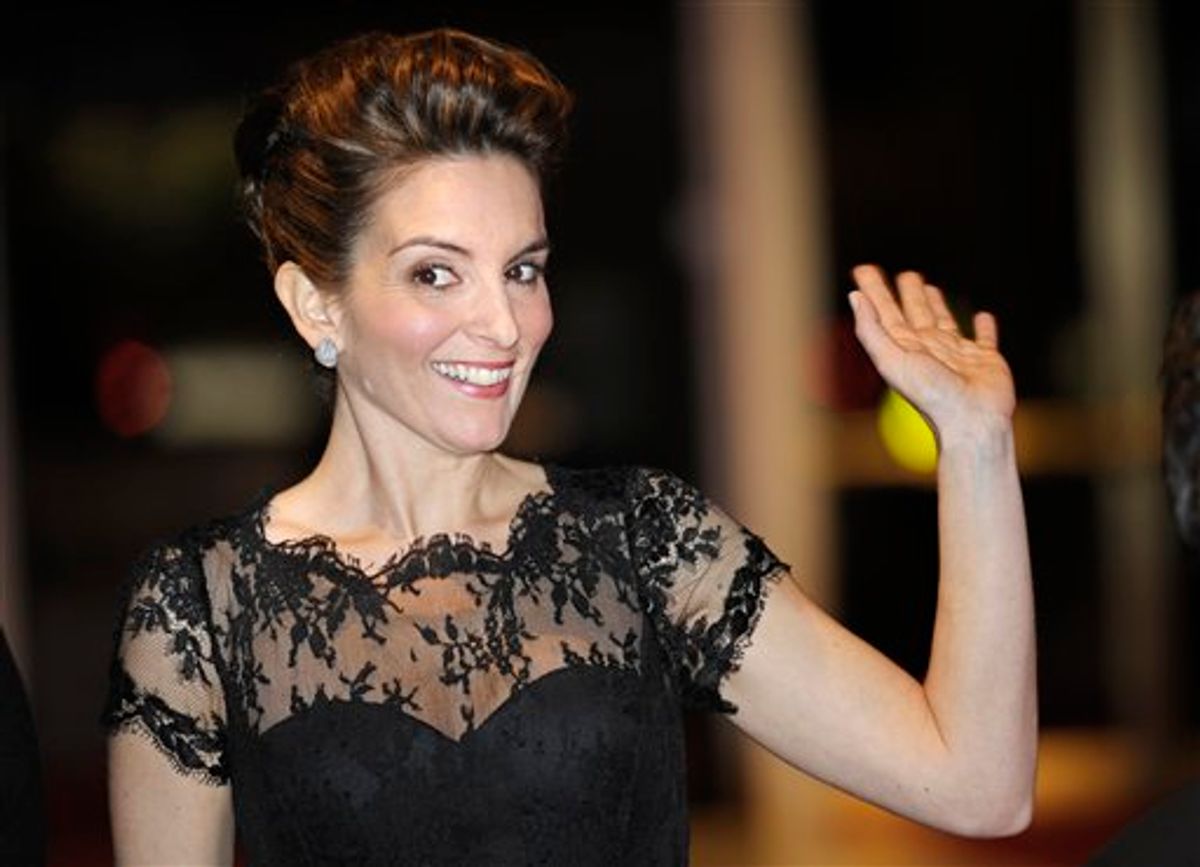Of course Tina Fey is brilliant. Of course she's one of the most insightful and hilarious figures in American comedy today. Of course she deserves every Emmy (seven, if you're counting), Golden Globe, Writers Guild of America and Teen Choice Award on her overstuffed shelf. She was the head writer for "Saturday Night Live." She gave us "Mean Girls" and "30 Rock." She's an icon to legions of urban career women -- a Carrie Bradshaw with more wit and fewer plantar warts. She's even in the No. 1 movie in the country, as reporter Roxanne Ritchie in "Megamind." And so when she was feted last week with the Mark Twain Prize for American Humor, in a comedy legend-packed evening at the Kennedy Center that aired Sunday on PBS (right opposite her Fey look-alike Sarah Palin's reality debut), it was in many ways cause for cheering.
But there also was something about the evening -- its mix of gentle Fey roasting and lavish praise, its abundance of Palin jokes combined with a delicately apolitical tone -- that took a considerable amount of that gloriously sharp, Samuel Clemens-ish philosophy of "the assault of laughter" out of the whole works.
Despite its impressive, 19th-century-evoking name, the Twain Prize doesn't have much of a history. It's only been around since 1998, when the Kennedy Center established it to "recognize those who create humor from their uniquely American experiences" and chose as its first honoree Richard Pryor. It's only been given posthumously once, to George Carlin, who died mere days after his award was announced in 2008. It's only been given to two other women: Whoopi Goldberg in 2001 and Lily Tomlin in 2003. And considering that last year's recipient was Bill Cosby, it's hard not to consider that Fey's acceptance speech words "Only in comedy is an obedient white girl from the suburbs a diversity candidate" were not entirely in jest.
If this prize is, after all, modeled on the American who best emulates Twain as a "fearless observer of society," wouldn't this have been the year of all years to give a nod to Jon Stewart whose fearlessness level has been off the charts? But maybe there's such a thing as too fearless, too political, too of the moment. And it has been seven years since anybody gave one of these things to a woman. So Fey, this year, it is.
It's undeniable that Fey has, in the short dozen years since she joined the writing staff of "Saturday Night Live," blossomed into an indispensable force in the American comedic landscape and the world's greatest retort to the charge that women can't be funny. Sunday night, she was funny indeed, thanking Sarah Palin for so much inspiration and lamenting that the Kennedy Center will soon be known as "the Tea Party Bowling Alley and Rifle Range."
But it's worth noting that her deadpan praise for conservative women in politics -- they're great "unless you don't want to pay for your own rape kit ... unless you're a lesbian who wants to get married to your partner of 20 years ... [or] unless you believe in evolution" -- did not make it to the broadcast. Nor, in fact, was there much evidence in all of the clips shown Sunday night of the wicked, often scathing social commentary that burns through Fey's work. This is not just the woman who wrote the "Mom Jeans" fake ad; she's the one who penned an entire episode of "30 Rock" revolving around an insulting word for the female genitalia, one who declared in 2008 that if McCain and Palin won the election "I'm leaving Earth."
For all her disarmingly bespectacled, girl-next-door appeal, the lady is an eviscerating wit whose humor touches on race, death, gender and all kinds of difficult, often terrible-to-talk-about stuff. She even slipped a highly contentious rape joke into "30 Rock's" season premiere this year.
Fey doesn't write that way because she is, according to her own self-description, a "stone cold bitch." She does it because she intuitively understands Twain's directive that "the hard and sordid things of life are too hard and too sordid and too cruel for us to know and touch them year after year without some mitigating influence." But if she is presented simply as that kooky neurotic gal from that sitcom, the accolades hardly seem worth giving. And sitting regally at the Kennedy Center, looking, as Amy Poehler observed, like Evita, Tina Fey seemed a little lost, like security had taken all the hard and cruel and sordid out of her purse, and left her with too little to bounce her genius against.

Shares